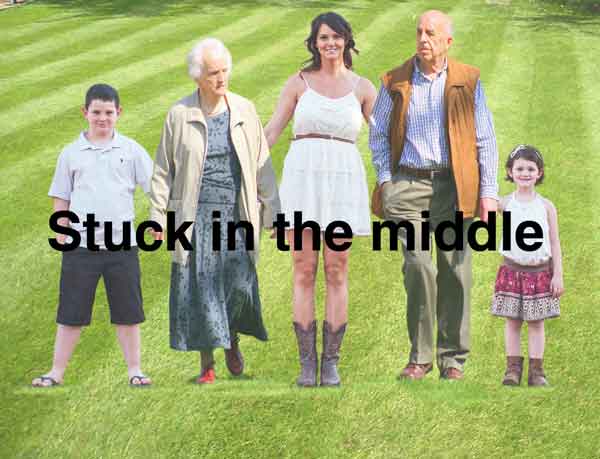They were asked to introduce themselves, going around the circle: name, age, etc.
But by the time they got to the fifth person around the table, deep, dark family secrets — sibling rivalries, financial ruin, deadbeat kids — were spilling out. The stories were accompanied by tears.
The Kleenex is next to the hummus platter, dear.
The “sandwich generation” has a lot to unload about these days. Their parents are old and need care. Their kids are old and still need care.
This is not the Margaritaville, empty-nest lifestyle they were hoping for. Wasn’t this the time they were supposed to finally buy a Miata?
The group I sat in on was a weeknight gathering of strangers who wanted more information about elder-care options, support for the journey ahead.
It was led by Deb Rubenstein, the director of consultation for Iona Senior Services in Northwest Washington, who answered questions about assisted living, hospice care, home health care and other complexities that come with aging. But, really, it’s Caregivers Anonymous.
“Hello, my name is Jane, and I’m a caregiver. I’ve been spat on, kicked, told I’m worthless, hazed and belittled. By my mother. Who has no idea who I am.”
They come for brochures and phone numbers and end up trading stories of pain and despair.
What’s going on with these folks — in late middle age or older — is relatively new to American society: the dual financial and emotional pull of super-needy kids who won’t leave the nest and extra-old parents who forgot where the nest is. This describes life for one in seven Americans today, according to a report released in January by the Pew Research Center.
Various kinds of sandwiches are described as we go around the table. I promised participants anonymity so they could be truthful about their situations.
There’s the university executive whose dad is hellbent on staying put in a town hundreds of miles from Washington with abysmal medical facilities and a graveyard of old friends who can’t help him anymore.
“I’m going to want to move him here, but I know he won’t budge,” the woman lamented, and the room nodded in recognition. Because Washington is the land of so many transplants, it’s common for local sandwichers to fight with aging parents about leaving winters in Minnesota or a two-story house on Long Island to move into a nice retirement community here.
“And there’s my daughter,” the university executive continued. “She’s going to graduate. Soon. Right?” Yes, the others assured her, her 26-year-old daughter will graduate. Soon.
Another woman described the “moment you’re never going to forget in your life: that first time you have to help a parent in the bathroom.”
“Try diapers,” said one with a nonagenarian mother in hospice care. And a brother who recently got out of jail.
And, yeah, there’s the whole issue of siblings. We fight with them when we’re little. Then we grow up, and we get to avoid them. But when it comes time to care for parents, all that rivalry comes rushing back.
“It’s like we’re right back in childhood,” said a woman from Virginia who had escaped the role as the “quiet sister” until she moved in with a sister to help care for their mother. Now three sisters — bossy, show-off and quiet — are reprising childhood battles as they care for Mom. Except now, they’re all middle-aged, and they are exhausted.
“Here’s the thing,” someone else said. “I’m going to find a place I want to go and have all of that squared away before I get old.”
Another interrupted her: “And I’m not going to have a basement full of crap. I’m not going to do this to my kids.”
At the end of the evening, they hugged, exchanged numbers and promised to stay in touch. Support groups meet the first and third Thursday of the month. But most knew they wouldn’t have time to come again.
Too many people at home need them.
Petula Dvorak is a columnist for The Washington Post.
Send questions/comments to the editors.



Success. Please wait for the page to reload. If the page does not reload within 5 seconds, please refresh the page.
Enter your email and password to access comments.
Hi, to comment on stories you must . This profile is in addition to your subscription and website login.
Already have a commenting profile? .
Invalid username/password.
Please check your email to confirm and complete your registration.
Only subscribers are eligible to post comments. Please subscribe or login first for digital access. Here’s why.
Use the form below to reset your password. When you've submitted your account email, we will send an email with a reset code.